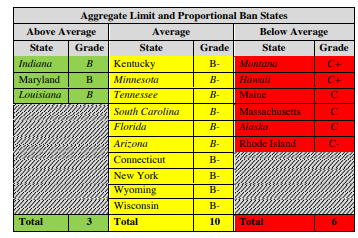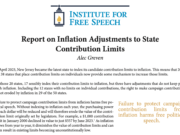The Center’s ninth Issue Analysis examines the potential impact of the Supreme Court’s McCutcheon decision on the states with existing aggregate limit provisions, particularly as it relates to the effect of those provisions on both public corruption rates and how well a state is governed.
For background, on April 2, 2014, the Supreme Court issued its decision in McCutcheon v. Federal Election Commission. In that case, plaintiff Shaun McCutcheon challenged the overall limits imposed on federal giving by individuals to candidate campaigns, political parties, and political action committees (PACs) instituted as part of 2002’s Bipartisan Campaign Reform Act. These aggregate limits are separate from the base individual contribution limits enforced in some manner by the federal government and 44 states on contributions to candidates, political parties, and/or PACs. In the Court’s 5-4 decision, it invalidated the federal aggregate limit on political giving as unconstitutional under the First Amendment.
Much hysteria has been spun by those favoring greater regulation of political speech about the need for aggregate limits to prevent corruption or the appearance thereof and to promote “good” government.
Just 19 states impose aggregate or proportional limits in varying forms on the overall amount individuals or groups may contribute to the candidates and causes of their choice. As the states are the “laboratories of democracy,” this Issue Analysis looks to their experience to examine the allegations of those who favor aggregate and proportional limits and argue that such limits are essential to curbing corruption and promoting “good” government.
As the evidence demonstrates, states with aggregate or proportional contribution limits are not any less corrupt than those states without aggregate limits (and arguably more so), and aggregate limit states are generally worse governed than those states which do not impose aggregate limits. Accordingly, perhaps it’s unsurprising that 31 states choose not to levy an aggregate limit on their citizens’ ability to support and associate with the candidates and causes of their choice.
Based on the outcome in McCutcheon, the aggregate limits in these 19 states are likely to be challenged, and many may be struck down as unconstitutional. In any event, state policymakers and the public can be assured that these aggregate limits only stifled speech while failing both to prevent corruption or the appearance of corruption and to produce better government.
https://www.ifs.org/wp-content/uploads/2014/04/2014-07-08_Issue-Analysis-9_Aggregate-And-Proportional-Limits-In-The-States-Have-They-Reduced-Corruption-Or-Promoted-Better-Government.pdf














